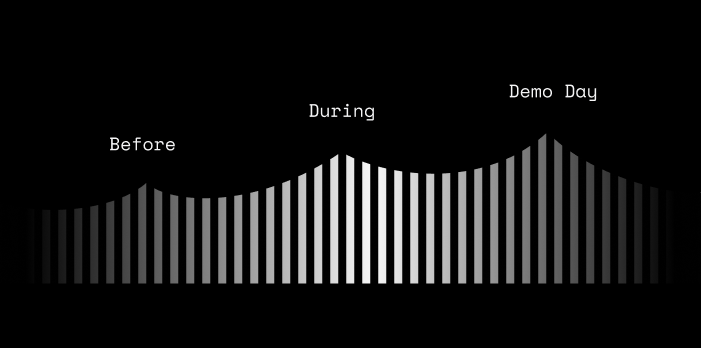- Call for ParticipantsLooking for a unique opportunity to collaborate with like-minded individuals on cutting-edge projects in the exciting world of Web3? Look no further than our upcoming HackerHouse event!
- Who can participate ?
- Programming skills is a must.
Preferably have participated in the
development of Web3 and open-source projects.
Willing to take up challenges in building
next-gen AA infra and dapps like the ones
below or with your own ideas.
- Programming skills is a must.
- Preferably have participated in the development of Web3 and open-source projects.
- Willing to take up challenges in building next-gen AA infra and dapps like the ones below or with your own ideas.

- What are we Looking for ?
During this event, we'll be bringing together the
brightest minds in Web3 development and researcher
for a week-long deep dive into all thingsAA.
During this event, we'll be bringing together the brightest minds in Web3 development and researcher for a week-long deep dive into all thingsAA.
- Schedule of Events
AA learning materials will be provided before the
event, which includes lectures, discussions, and
brainstorming sessions for project development.
Mentors will offer guidance, anda Demo Day with VC
and industry expert where attendee will showcase
project outcomes.
AA learning materials will be provided before the event, which includes lectures, discussions, andbrainstorming sessionsfor project development. Mentors will offer guidance, and a Demo Day with VC and industry expert where attendee will showcase project outcomes.

- IdeasMarc@Candide Wallet
1.Dapp with a single Tap:
Batched transactions allow you to perform multiple transactions in one single on-chain transaction. You can send
an array of transactions and they will all get processed in 1 single transaction. Some ideas:
- Leverage: Build a one click experience on single sided lending protocols that allows users to leverage their
collateral by depositing and borrowing x amount of times
- Multi-trades: Build a way for users to trade multiple assets in a single tx on an exchange
Batched transactions allow you to perform multiple transactions in one single on-chain transaction. You can send an array of transactions and they will all get processed in 1 single transaction. Some ideas:
- Leverage: Build a one click experience on single sided lending protocols that allows users to leverage their collateral by depositing and borrowing x amount of times
- Multi-trades: Build a way for users to trade multiple assets in a single tx on an exchange
Harry@Antalpha Labs1.Decentralized bundler network
Transactions will be cached in the pool, and which transaction go first
is where MEV take place,there are several teams working on this:
Transactions will be cached in the pool, and which transaction go first is where MEV take place,there are several teams working on this:https://github.com/kristofgazso/erc4337-mev-searcher-bothttps://github.com/NethermindEth/mev-aa-geth
2.Solidity library: different types of contracts for factory, paymaster
There will be different implementations for those contracts to meet different needs. For example for DAOs,
they may need multi-sign and verify.
There will be different implementations for those contracts to meet different needs. For example for DAOs, they may need multi-sign and verify.
Gigi@Antalpha Labs1.Mobile interface improvement for the mass adoption
AA brings mass adoption and what would be better than a seamless mobile app where you won't even notice the gas
fee. A thorough research of the available AA wallet would be essential. eg. Pimlico, Stackup, Candidewallet.
More so by searching on the AA embedded Starkware & Zksync chains.
AA brings mass adoption and what would be better than a seamless mobile app where you won't even notice the gas fee. A thorough research of the available AA wallet would be essential. eg. Pimlico, Stackup, Candidewallet. More so by searching on the AA embedded Starkware & Zksync chains.
2.Sub EIP standard for dapps interacting with AA
It sucks when you try to connect but it shows your dapp does not support such activity, it would cause a lot
of friction if all dapp come up with their own way each time aa gets updated. So instead if there are some
standard few lines of could but simple enough for dapp to integrate.
It sucks when you try to connect but it shows your dapp does not support such activity, it would cause a lot of friction if all dapp come up with their own way each time aa gets updated. So instead if there are some standard few lines of could but simple enough for dapp to integrate.
Circle@Antalpha Venture1.Leverage EigenLayerto enable Ethereum's validator to act as Paymaster.
The current plan to prevent a DOS attack from Paymaster is to build a reputation system or have them stake funds
into the entry point contract, However, this method yields weak trust assumptions and low capital efficiency, why
not try to leverage re-staking to push the slash-able conditions on to Ethereum's validator so that Paymaster
can be more trustless.
The current plan to prevent a DOS attack from Paymaster is to build a reputation system or have them stake funds into the entry point contract, However, this method yields weak trust assumptions and low capital efficiency, why not try to leverage re-staking to push the slash-able conditions on to Ethereum's validator so that Paymaster can be more trustless.
2.How to make AA more chain-agnostic?
One of the advantages that MPC wallet has compared to Multisig wallet is that they are Chain-agnostic. It
seems like ERC 4337 only stands in an EVM-compatible environment, are there any methods that we can
accomplish chain-agnostic AA?
One of the advantages that MPC wallet has compared to Multisig wallet is that they are Chain-agnostic. It seems like ERC 4337 only stands in an EVM-compatible environment, are there any methods that we can accomplish chain-agnostic AA?
Youai@Antalpha1.Security: How to avoid smart contract risk?
- code review/audit
- permission control mechanisms
- standardized contract libraries(EIP)
- avoid excessive reliance on external data(reliable oracle)
2.Composability:
By separating contract logic into multiple modules and managing and combining them through abstract accounts,
more complex and feature-rich applications can be built, and they can be shared and reused across different
applications.
By separating contract logic into multiple modules and managing and combining them through abstract accounts, more complex and feature-rich applications can be built, and they can be shared and reused across different applications.
George@Unipass1.Explore different modular architectures.
Implement a different modular architecture;Build modules based on them
e.g, EthDenver2023 finalisthttps://www.rhinestone.wtf/
Implement a different modular architecture;Build modules based on them e.g, EthDenver2023 finalisthttps://www.rhinestone.wtf/
2.Automated detection of contract and app that are not compatible with Account Abstraction
(public good)
Marc@Candide Wallet1.Dapp with a single Tap:
Batched transactions allow you to perform multiple transactions in one single on-chain transaction. You can send
an array of transactions and they will all get processed in 1 single transaction. Some ideas:
- Leverage: Build a one click experience on single sided lending protocols that allows users to leverage their
collateral by depositing and borrowing x amount of times
- Multi-trades: Build a way for users to trade multiple assets in a single tx on an exchange
Batched transactions allow you to perform multiple transactions in one single on-chain transaction. You can send an array of transactions and they will all get processed in 1 single transaction. Some ideas:
- Leverage: Build a one click experience on single sided lending protocols that allows users to leverage their collateral by depositing and borrowing x amount of times
- Multi-trades: Build a way for users to trade multiple assets in a single tx on an exchange
2.Different Signature Verification Schemes:
Use mobile devices secure enclave;BLS aggregation
Use mobile devices secure enclave;
BLS aggregation
Harry@Antalpha Labs1.Decentralized bundler network
Transactions will be cached in the pool, and which transaction go first
is where MEV take place,there are several teams working on this:
Transactions will be cached in the pool, and which transaction go first is where MEV take place,there are several teams working on this:https://github.com/kristofgazso/erc4337-mev-searcher-bothttps://github.com/NethermindEth/mev-aa-geth
2.Solidity library: different types of contracts for factory, paymaster
There will be different implementations for those contracts to meet different needs. For example for DAOs,
they may need multi-sign and verify.
There will be different implementations for those contracts to meet different needs. For example for DAOs, they may need multi-sign and verify.
- Leverage: Build a one click experience on single sided lending protocols that allows users to leverage their
Whether you're an experienced Web3 developer looking to push the limits of what's possible, or a curious
researcher eager to explore new possibilities, our HackerHouse event is the perfect place to take your
skills to the next level.
So why wait? Sign up today and be part of the future of Web3!
Whether you're an experienced Web3 developer looking to push the limits of what's possible, or a curious researcher eager to explore new possibilities, our HackerHouse event is the perfect place to take your skills to the next level.
So why wait? Sign up today and be part of the future of Web3!
- We're Proud to partner with...
2.Different Signature Verification Schemes:
Use mobile devices secure enclave;BLS aggregation
Use mobile devices secure enclave;
BLS aggregation